Food Studies News
2018-2019: A Year In Review
Newsletter of the Graduate Program in Food Studies
Inside this Issue
Food Studies program hosts guest speaker series
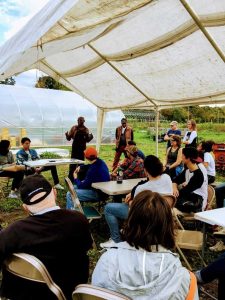
On October 4, St. Paul, Minnesota-based, 2017 McKnight Distinguished Artist, Dr. Seitu Jones gave a lecture titled “CREATE: Art, Act & Eat,” where he discussed how he draws from both food and activism to inspire his public art projects, and how these components bring about new community stories. On October 6, Jones led a hands-on workshop at local Brady Faith Farm connecting food stories and community art.
On October 30, Food Studies co-hosted a roundtable panel titled “Migrant Rights and the Labor of Food Justice, A Platica” with Dr. Steven Alvarez from St. John’s University Department of English, Crispin Hernandez from the Workers Center of CNY and Food Studies professor Dr. Laura-Anne Minkoff-Zern, Steven’s scholarship contributes to ongoing research concerning literacy, foodways, immigration, and writing studies, focusing on the humanizing element of sharing food as a form of social care. The Workers Center of CNY discussed current labor and legal struggles of immigrant farmworkers in New York State. Dr. Minkoff-Zern’s interdisciplinary work on food and racial justice, transnational agricultural projects, and migrant health helped to frame contemporary social justice issues for migrant workers.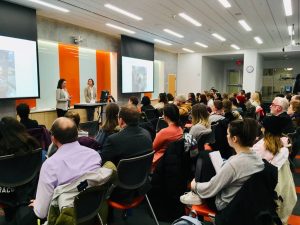
On October 31, Food Studies hosted Canadian food policy analyst and writer Wayne Roberts, who spoke about his time as manager of the Toronto Food Policy Council from 2000-2010. He presented on aspects from his book, “The No-Nonsense Guide to World Food,” about the relation of the global food system to climate change and economic disaster.
On February 14, the Food Studies program co-sponsored Dr. Sarah Bowen of North Carolina State University and Dr. Joslyn Brenton of Ithaca College as they presented their 2019 book, “Pressure Cooker: Why Home Cooking Won’t Solve Our Problems and What We Can Do About It.” In their talk they urged folks to look beyond romantic images of family-style meals to find fixes to the food system that are fair, equitable, and nourishing.
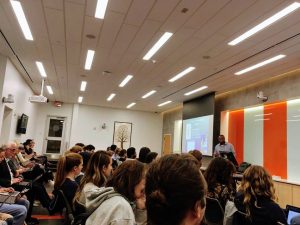
On April 8, the department hosted Dr. Jahi Chappell for a lecture on his 2018 book, “Beginning to End Hunger: Lessons on food security, transformation, and solidarity in Belo Horizonte, Brazil.” Dr. Chappell is a Senior Research Fellow of Agroecology and Agricultural Policy at Coventry University. He discussed the research he conducted on Brazil’s novel approach to ending hunger, offering ideas about how to enact policies that improve city food security.
Graduate Student Highlights
Maegan Krajewski
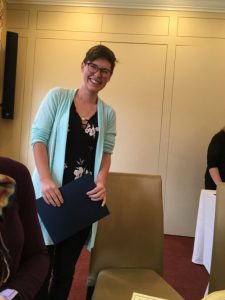
Adrianne Traub
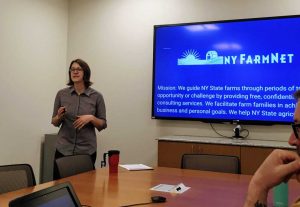
Katie Mott
Katie Mott served as a Graduate Research Fellow in the Lerner Center for Public Health and Promotion this year in addition to her role as a Teaching Assistant for Food Studies courses. Her research brief, “Lotta Food, No Money: Syracuse’s Poor Have Challenges that are Much Bigger than Food Access,” was published on February 12. In it, she discusses the findings from her research after the closing of a locally-owned grocery store in Syracuse’s Near Westside neighborhood. Mott was interviewed on local station NPR about this work. Mott will defend her thesis research, also related to food access and the closing of the Nojaim Brothers grocery store, in summer 2019.
Cheyenne Schoen
Cheyenne Schoen conducted research with the Syracuse Refugee and Immigrant Self-Empowerment agricultural partnership program for her thesis. In October she presented preliminary findings from her research at the 2019 Graduate Association for Food Studies conference, and will present the final version at the 2019 ASFS/AFHVS conference. She served on the editorial board of the Graduate Journal of Food Studies and as a Research Assistant for the Food Studies department.
William Cecio
William Cecio (B.S. 2017) served as Research and Teaching Assistants for Food Studies. His practicum research will involve urban food governance. He will present his research, “Urban Food Governance and Social Reproduction: A Literature Review” at the 2019 ASFS/AFHVS conference. Cecio has a bachelor in Food Studies from Falk College.
Sara Weber
Sara Weber was accepted to present her research project, “Examining Food Waste in the Hospitality Industry: How Can Guests and Hotels Prevent and Reduce Food Waste at the Preparation and Consumption Points of the Food Supply Chain?” at the 2019 ASFS/AFHVS conference. She holds bachelor in Sociology and Political Science from Utah State University and is the House Director of Alpha Chi Omega Fraternity at SU.
Camila Ferguson-Sierra
Camila Ferguson-Sierra was a Teaching Assistant and her work, “Palm Oil, Food Insecurity, and Land in Colombia: A Literature Review,” was accepted as a 2019 ASFS/AFHVS conference presentation. Ferguson-Sierra has a bachelor in Conservation Biology from SUNY College of Environmental Science and Forestry.
Maryssa Schlough
Maryssa Schlough is conducting research on school food programming in Onondaga County for her practicum project. Schlough comes to the program with background as a Youth Farm Educator for Montezuma Farm to School Program. She has a bachelor in International and Global Studies from University of Wisconsin-Milwaukee.
Collin Townsend
Collin Townsend (B.S. 2018) plans to conduct his thesis research on the restaurant industry in Syracuse. He is a Research Assistant for the Food Studies department, an experienced chef with over a decade of experience, and owns CJT Food Business Consulting firm. He has worked as a research assistant on the FoodPlanCNY project and as a Workforce Educator at With Love Onondaga Community College. He holds a bachelor in Food Studies Falk College.
Alumni News
Briana Alfaro, MS, 2018 joined the staff of Northeast Organic Farming Association New York (NOFA-NY) as their Outreach Coordinator in Fall 2018. She is also beginning a flower farm in Syracuse.
Irma Nurliawati, MS, 2018 works as an Agri-Food Quality Inspector at the Plant Biosafety Division, Agricultural Quarantine Agency, Ministry of Agriculture in the Republic of Indonesia.
Hillary Chartron-Bartholomew, MS, 2018 works as the Director of Human Resources, Information Technology, Communications & Operations at Cornell Cooperative Extension of Onondaga County.
Molly Ennist, MS, 2018 works as a budget analyst for the New York State Department of Education.
Scrapbook
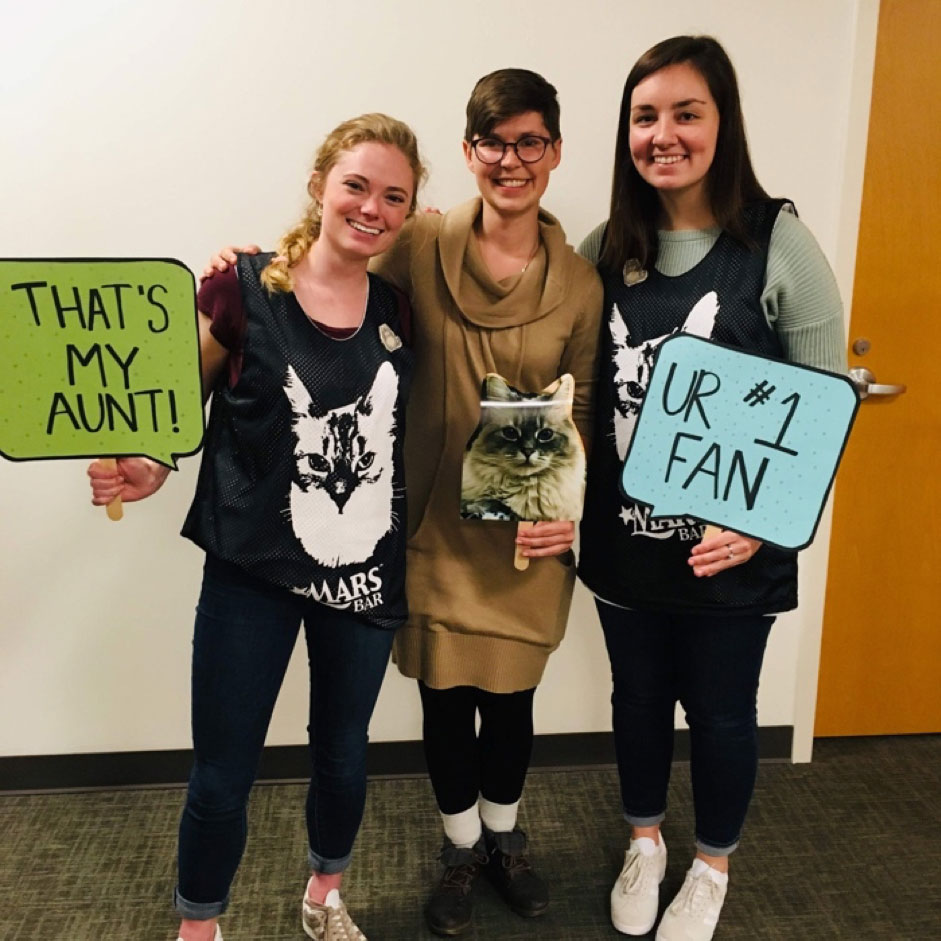
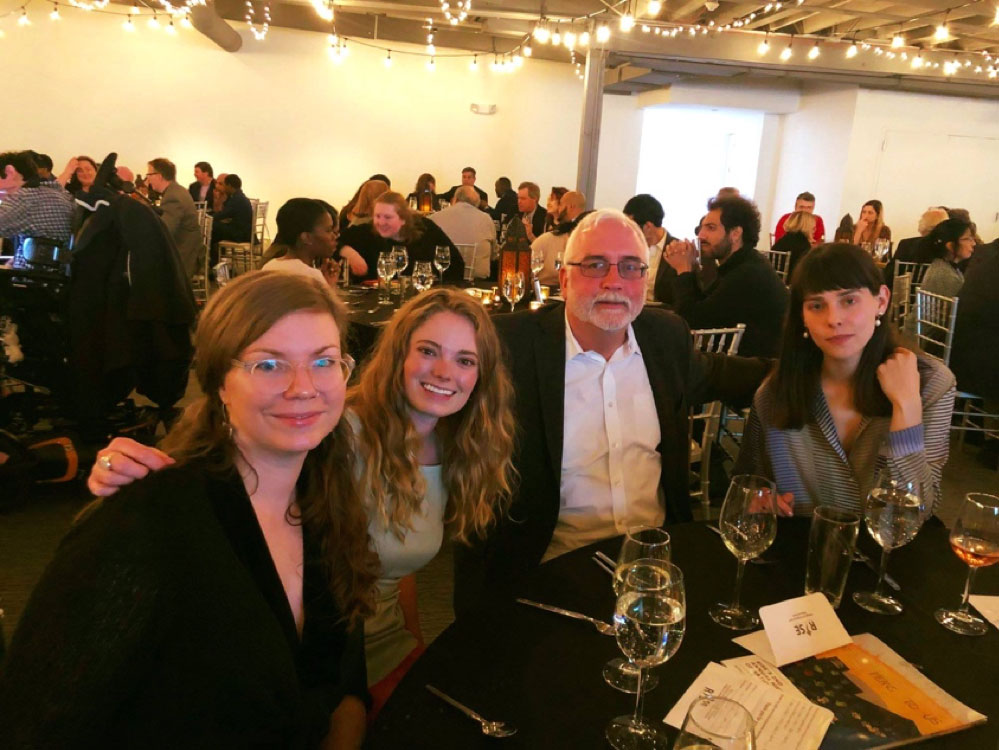
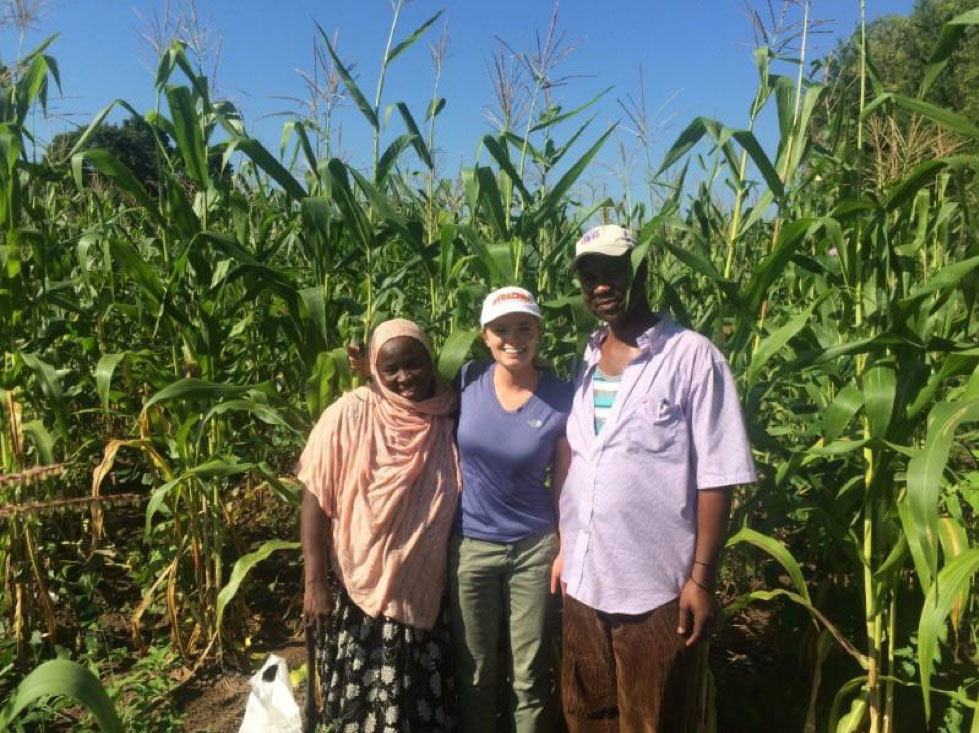
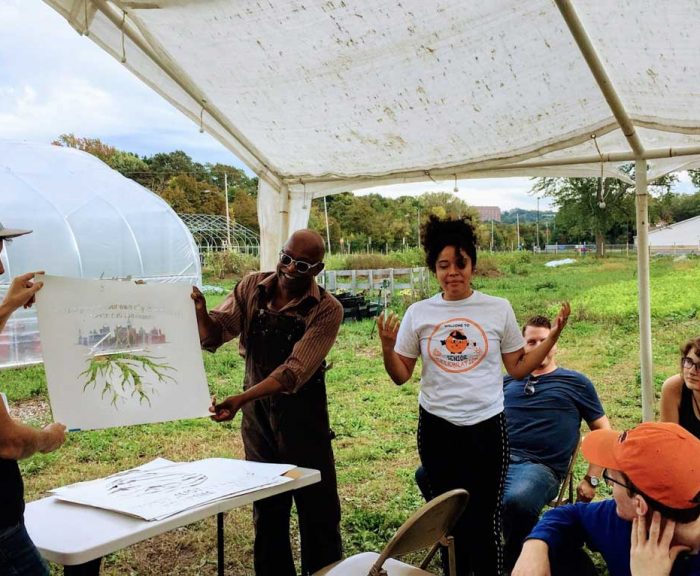
Learn more about Food Studies
Browse our academic programs
Learn about our excellent faculty
Meet our students
Read about research our students are engaged in
Contact us
Food Studies program helps bring year-round fresh produce
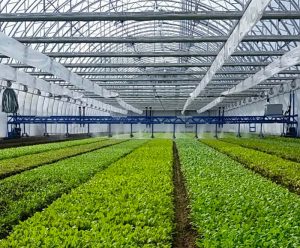
Earlier this year, the Food Studies Program in Falk College worked with the Adirondack North Country Association, a nonprofit that connects university and K-12 institutions with local farms, to bring to campus Kevin Richardson, Agbotic Farms executive vice president of sales and operations. Richardson met with Sustainability Management and Food Services staff, and Food Studies faculty, and a partnership was created.
Food Services and Sustainability Management staff took a trip to the farm to learn more about the operation. “The Food Services team was excited to make the visit to determine if their products would be a good fit for Syracuse University,” says Mark Tewksbury, director of residential dining. The University does its best to serve locally grown produce, but that has proven to be a challenge with New York’s short growing season.
Part of the review process involved learning if students liked the product. Food Services invited Agbotic Farms to share their produce at a Wednesday Feedback event at the Ernie Davis Dining Center this past February. Response to the baby greens was overwhelmingly positive. “The greens are new, fresh and a bit sweet,” remarked one of the student taste testers.
Read more about this partnership and the farm
Message from Dean Murphy
The Falk College Office of the Dean, faculty, staff, and students extend our most heartfelt condolences and stand in solidarity with our colleagues and friends at the Newhouse School following the passing of their esteemed and beloved Dean Lorraine Branham. The meaningful orange ribbons adorning the trees surrounding Newhouse, placed following yesterday’s vigil, are a beautiful reminder of her lasting influence on the lives of those closest to her, as well as those across campus and beyond. Her love and contributions to Newhouse will be realized well into the future as a great legacy. An inspiring leader and a dear friend, we carry her in our hearts.
Read the Message from Chancellor Kent Syverud
2019 Falk Student Research Celebration Takes Place March 26-29
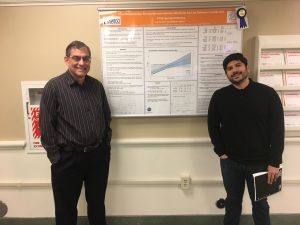
Falk students are invited to submit posters for completed or in-progress empirical, exploratory, policy analytic or hypothesis-driven research projects using qualitative, quantitative, or mixed methods for display, judging, and awards in the 2019 Falk Student Research Celebration March 26-29. The multi-day event will highlight Falk students’ research collaborations and their dedication to advancing research knowledge.
Poster entry forms are due March 7 and poster submissions are due March 21. Posters will be on display beginning March 26 near the second floor student lounge and the Falk Café on 2 in the Falk Complex, with judging and awards taking place March 27. Students will present their posters from 12 to 1 p.m. on March 27 and 28.
The Falk College Office of Research Development promotes a robust, collaborative research community in which students play an active role. At Falk, graduate and undergraduate students have the opportunity to work directly with faculty to collect data, analyze findings and draw conclusions on relevant topics surrounding public health, food studies, nutrition, sport management, human development and family science, social work, and marriage and family therapy.
“Conducting research as a student has many benefits, including building a strong relationship with Falk faculty members, improving writing and statistical analysis skills, and creating connections both on and off campus,” says instructor Jessica L. Garay. “Because much of the research in Falk College has real-world implications, we want students to be able to share their findings publicly, and the Falk Student Research Celebration is the perfect opportunity to do so.”
“The student research days is a great showcase of the work our students are doing to understand the world and the human condition,” says assistant professor David Larsen. “It’s always fun to see the new ideas that our students have, and how they are seeking to improve the world we live in.”
Assistant professor Bhavneet Walia agrees. “It’s a great way to quench your curiosity,” she says. “Come see what our students are up to at the Falk Student Research Celebration.”
Winners of the 2018 Falk Student Research Celebration, held March 27-30, 2018, included research in a wide range of topics, such as maternal health, accessibility, and PTSD.
For more information about the 2019 Falk Student Research Celebration, contact Amy Dumas adumas@syr.edu at the Falk College Office of Research Development.
BrainFeeders connects local farms to Syracuse campus
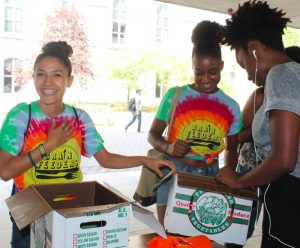
This fall, fresh, locally-grown produce made its way to campus each week through the Community Supported Agriculture (CSA) program at Syracuse University, founded and operated by BrainFeeders, the first academically-recognized food studies student organization in the nation.
By connecting the campus to local farms, BrainFeeders hopes to deliver more than just great produce to the Syracuse campus. They strive to increase food access and sustainability, while encouraging peers to be more involved in food choices at Syracuse.
A CSA is a partnership between farmers and community members in which individuals purchase a share of a farm’s harvest, and in turn, the farm provides shareholders with seasonal produce. Direct exchange between farmer and consumer can help make fresh produce more affordable.
Laura-Anne Minkoff-Zern, Ph.D. is an assistant professor of food studies and advisor for BrainFeeders. “The CSA model helps farmers sustain themselves through the season, while also connecting consumers, in this case university students, faculty, and staff, with a more intimate connection to a particular farm,” she says. “These consumers also learn what is available throughout the local growing season and are challenged to adjust their diets to seasonal availability, thus supporting our region’s agrarian economy and community.”
A standard CSA share from Common Thread Community Farm in Madison, New York feeds 2 to 3 adults and includes 8 to 10 items of produce each week. Common Thread has delivered $22,957 in shares to members of the Syracuse University and SUNY College Environmental Science and Forestry campuses since BrainFeeders created the CSA in 2015.
Falk College’s food studies program explores the political economy of food. Students are challenged to critically question who has access to farmable land, how food is produced, processed and transported to restaurants and homes, who has access to nutritious food, what happens to food waste, and what these factors mean for people and the planet.
“BrainFeeders strives to provide opportunities for students and faculty alike to build a stronger relationship with their food, where it comes from, and the people who provide it,” says BrainFeeders president Caitlyn Colton ’19. “We want to make a lasting impact on our campus by increasing access to local foods and opening a gateway for our community to learn about our food system so they can make more educated choices for themselves and their environment.”
A vibrant community of active student organizations brings Falk College to life, from the Nutrition Education and Promotion Association (NEPA) and the Society for Public Health Education (SOPHE), which promote health education and awareness on campus and in the community, to sport management special interest groups, such as the Sport Professionals of Color and the first collegiate chapter of WISE (Women in Sports and Events). The broader University is home to more than 300 student organizations.
Members of the Syracuse University and SUNY ESF campus communities who are interested in participating in the CSA fall 2019 may email brainfeederscsa@gmail.com to add their name to the waitlist. For more information about BrainFeeders’ campus CSA, visit the Falk College website.
Weissman discusses potential impact of Tops grocery store closings

Evan Weissman, Ph.D., assistant professor of food studies, speaks with NewsRadio 570 WSYR on the potential impact of the Tops grocery store closings. Dr. Weissman’s research examines grassroots efforts to address food disparities in urban America. He teaches introductory and upper-division courses in food studies and employ hands-on approaches through community engagement. Dr. Weissman is a founding member and currently serves on the board of Syracuse Grows, a grassroots network that cultivates food justice through advocacy, education, and resources in support of urban food production.
Artist Seitu Jones visits for lecture and workshop October 4, 6

Falk College’s food studies program, together with the Syracuse University College of Visual and Performing Arts (VPA), Canary Lab, and the Humanities Center, partnering with Brady Farm in Syracuse, are pleased to welcome artist Seitu Jones to campus for a lecture and a workshop October 4 and 6, part of the Humanities Center’s 2018/19 Stories Symposium.
Jones will give a lecture, “CREATE: Art, Act & Eat,” on October 4 in Watson Auditorium from 6:30 to 8:30 p.m. where he will discuss how he draws from both food and activism to inspire his public art projects, and how these components bring about new community stories. On October 6 from 2:00 to 4:30 p.m. at Brady Farm in Syracuse, Jones will lead a hands-on workshop connecting food stories and community art. Reservations are required for participation in the Saturday workshop.
About Seitu Jones
Seitu Jones was born in Minneapolis in 1951. Working on his own or in collaboration, Jones has created over 30 large-scale public art works. He’s been awarded a Minnesota State Arts Board Fellowship, a McKnight Visual Artist Fellowship, a Bush Artist Fellowship, a Bush Leadership Fellowship, and a National Endowment for the Arts/Theater Communication Group Designer Fellowship. Seitu was awarded a 2001-2002 Loeb Fellowship at the Harvard Graduate School of Design and was the Artist-in-Residence in the Harvard Ceramics Program. He was Millennium Artist-in-Residence for 651 Arts in Brooklyn, NY, and was the first Artist-in-Residence for the City of Minneapolis. In 2014, he integrated artwork into three stations for the new Greenline Light Rail Transit system in the Twin Cities. A 2013 Joyce Award, from Chicago’s Joyce Foundation allowed Seitu to develop CREATE: The Community Meal, a dinner for 2,000 people at a table a half a mile long. The project focused on access to healthy food. Seitu is working with members of his neighborhood to create a 5-acre farm in a new St. Paul city park. For 18 months Seitu was a Senior Fellow in Agricultural Systems in the College of Food, Agriculture and Natural Science Resources at the University of Minnesota. Jones received an MLS in Environmental History and a BS in Landscape Design from the University of Minnesota.
Falk College welcomes new faculty and staff
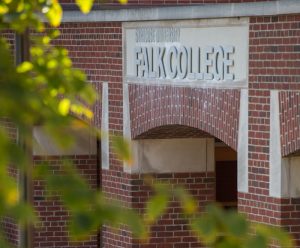 Syracuse University’s Falk College is pleased to announce the appointment of new staff members who have joined Falk College in the past academic year, including Nikki Beckwith, director of dietetic internship program, Trinity Benton, kitchen technician, and Deana Hansen-Danis, procurement coordinator in the Department of Public Health, Food Studies, and Nutrition; Bradford Ducre, computer consultant in information technology, and; Lisa Liparulo, internship placement coordinator in the Department of Sport Management.
Syracuse University’s Falk College is pleased to announce the appointment of new staff members who have joined Falk College in the past academic year, including Nikki Beckwith, director of dietetic internship program, Trinity Benton, kitchen technician, and Deana Hansen-Danis, procurement coordinator in the Department of Public Health, Food Studies, and Nutrition; Bradford Ducre, computer consultant in information technology, and; Lisa Liparulo, internship placement coordinator in the Department of Sport Management.
It also welcomes ten new faculty members, Chaya Charles, Jennifer Genovese, Ryan Heath, Bryce Hruska, Kenneth Marfilius, David Meluni, Jessica L. Garay, Sara Vasilenko, Bhavneet Walia, and Najah Zaaeed.
Chaya Lee Charles, M.S., R.D.N., C.S.G., C.D.N.
Nutrition & Food Studies
Chaya Charles joins the Department of Nutrition & Food Studies as an assistant teaching professor in the nutrition program.
Prior to her appointment as assistant teaching professor, Charles has worked as an adjunct instructor in the Department of Nutrition & Food Studies at Falk College since 2014. In addition, she is currently a consultant dietitian for Sodexo at Menorah Park and senior nutrition consultant for Oswego County Opportunities. She has previously held titles such as outpatient dietitian, clinical dietitian, and nutrition services manager at various health care facilities.
Charles completed both her B.S. degree in nutrition, and her M.S. degree in nutrition science at Syracuse University. Her master’s thesis is titled “Comparing Vegan and Vegetarian Attitudes, Beliefs and Perceptions with Risk for Disordered Eating Behavior.” She is also published in the Journal of the Academy of Nutrition and Dietetics.
Charles is a board-certified specialist in gerontological nutrition, a registered instructor for the National Restaurant Association’s ManageFirst Program courses, ServSafe certified, and certified in food and beverage cost control. She is the recipient of the 2014 Sodexo Clinical Innovation Award, 2011 Sodexo Northeast Regional Dietitian of the Year, and winner of the 2010 National Sodexo Nutrition Outcomes Study.
Areas of specialization: Vegetarianism and disordered eating behaviors, malnutrition prevention in the elderly, cardiovascular and diabetic nutrition counseling, nutritional intervention for wound healing, weight loss counseling, meal planning guidance and the provision of nutritious menus in institutional and home settings.
Jennifer Cornish Genovese, A.C.S.W., Ph.D.
School of Social Work
Jennifer Cornish Genovese joins Syracuse University’s Falk College as an assistant teaching professor in the School of Social Work. She has previously taught in the College’s Department of Human Development and Family Science and in the School of Social Work, including courses such as Power, Conflict, & Violence in the Family; Interpersonal Competence; Family Systems Theory; Advanced Practice with Individuals, Families, and Groups; and Practice with Children, Adolescents, and Families.
Genovese is a NYS Licensed Certified Social Worker and has worked in private practice as a psychotherapist for 30 years. She specializes in the treatment of abused children and adolescents. She is a clinical consultant for the NYS Department of Social Services and facilitates monthly support groups on secondary traumatic stress of child welfare workers in multiple Central New York counties. She is also a program and ministry consultant for the Bishop of the Evangelical Lutheran Church Upstate NY Synod.
Genovese has presented for the National Association of Social Workers (NASW) Professional Symposium in Chicago, IL and for NASW’s Annual Meeting. She was previously employed by St. Joseph’s Hospital Health Center as the outpatient clinic manager of the Mental Health Services Department. Genovese formerly served on the board of directors for Girls Inc. and the Mohawk Valley Committee for the Prevention of Child Abuse and Neglect. She was the co-host of two long-running radio programs in Syracuse, NY: Teen Talk on 93Q FM and Parenting Matters on 570 AM and 88 WAER FM.
Genovese completed a Ph.D. in child and family studies and M.S.W. at Syracuse University’s Falk College, as well as a B.A. in sociology from the State University of New York College at Cortland.
Areas of specialization: Assessment and treatment of physically and sexually abused children and adolescents, treatment of bereavement, loss and trauma in children, adolescents, and identification and intervention of secondary traumatic stress of child welfare workers.
Ryan D. Heath, M.A, L.C.S.W., Ph.D.
School of Social Work
Ryan Heath joins the School of Social Work as an assistant professor. Heath’s research seeks to understand how out-of-school programs (e.g., extracurricular, afterschool and summer programs) promote the social-emotional development of low-income youth, students of color, and other historically marginalized youth. To improve the reach, quality, and impact of these programs, his work aims to elucidate how extracurricular programs interface with other social-ecological contexts that affect youth, such as schools, peers and families, and to identify the potential mechanisms through which extracurricular programs influence youth’s social-emotional development and educational attainment. He has been involved in several research projects, most recently as a collaborator on the “Becoming Effective Learners—Out-of-School Time Study” with The Consortium for School Research at the University of Chicago. Heath has published in Youth & Society, Urban Review, Urban Education, LGBT Health, and Pediatric Research. He is also co-author of the research report, Foundations of Young Adult Success: A Developmental Framework.
Prior to joining Syracuse University, Heath taught classes on research methods and cognitive-behavioral therapy at the School of Social Service Administration at the University of Chicago. As a clinical social worker, Heath has implemented cognitive-behavioral interventions with adolescents and youth groups in both school-based and community settings. He previously worked as a clinical director for Chicago Adventure Therapy, as a school-based therapist at UCAN, as a therapeutic learning coach for Project EDGE of OMNI Youth Services, and as a teen outreach program coordinator at Health Quarters.
Heath earned a master’s degree in clinical social work and a Ph.D. from the University of Chicago School of Social Service Administration. As a doctoral student, Heath received a pre-doctoral fellowship from the Institute of Education Sciences and the University of Chicago Committee on Education, and completed a graduate certificate in interdisciplinary education sciences. He completed a bachelor’s degree in science with honors from Brown University.
Areas of specialization: Adolescent development, extracurricular and out-of-school programs, social-emotional learning, educational attainment, youth social services, school and community partnerships.
Bryce Hruska, Ph.D.
Public Health
Bryce Hruska is an assistant professor in the Falk College public health program where he has served as a research assistant professor, postdoctoral researcher, and project manager for the public health program. He was previously a postdoctoral fellow at the Vermont Center on Behavior and Health.
Hruska’s research focuses on better understanding how psychological stress “gets under the skin” to impact physical health. Since coming to Falk College, his work has primarily consisted of overseeing the operations of two research projects: “Environmental Toxicants, Race, and Cardiovascular Disease Risk in Children” and “The Psychosocial and Physiological Consequences of Taking and Not Taking Time Off from Work.”
He has most recently published in the Journal of Substance Abuse Treatment, Headache: The Journal of Head and Face Pain, as well as Environmental Research, Psychology of Addictive Behaviors, and Social Science and Medicine, among others. He has published book chapters in the Handbook of Cardiovascular Behavioral Medicine and in Trauma and Substance Abuse: Causes, Consequences, and Treatment of Comorbid Disorders, Second Edition.
Hruska has presented his research at conferences including the International Society for Traumatic Stress Studies, the American Psychosomatic Society, and the College on Problems of Drug Dependence. He has made multiple media appearances promoting the research that he and his collaborators are performing, and he serves as an invited reviewer for a number of peer-reviewed journals including the Journal of Traumatic Stress, Journal of Anxiety Disorders, Stress and Health, Addictive Behaviors, and Journal of Psychoactive Drugs.
Hruska earned an M.A. and Ph.D. in experimental psychology, with concentrations in health psychology and quantitative methods, both from Kent State University. He earned a bachelor’s degree in psychology from the University of Akron.
Areas of specialization: Traumatic events, posttraumatic stress disorder (PTSD), stress and health, occupational stress, recovery experiences, quantitative methods.
Kenneth James Marfilius III, L.C.S.W., D.S.W.
School of Social Work
Kenneth Marfilius joins Falk College as a visiting teaching professor in the School of Social Work.
While active duty, Marfilius served in the U.S. Air Force Biomedical Science Corps in multiple roles: active duty clinical social worker, mental health therapist, family advocacy officer in charge, and as manager of the alcohol and drug prevention and treatment program. He was commissioned in 2013 and was discharged in 2016 having obtained the rank of captain. At the Barksdale Air Force Base, Marfilius served in a variety of mental health roles related to sexual assault prevention and response, suicide prevention, and traumatic stress. Marfilius has also worked for the U.S. Department of Veteran Affairs at the Syracuse VA Medical Center in the Healthcare for Homeless Veterans Program, and as a disruptive behavior committee member.
Marfilius previously taught courses such as Social Work Practice in Mental Health and Introduction to Military Culture and Social Work Practice, as well as guest and continuing education lectures at Falk College, and has presented for the Supportive Services for Veterans and Families (SSVF) and at the Association for Humanistic Counseling National Conference. He recently guest lectured at the University of Pennsylvania on “Trauma— Informed Care, Housing First, and Critical Time Intervention for Veteran Homelessness.”
Marfilius is honored with a National Defense Service Medal, Global War on Terrorism Service Medal, and Nuclear Deterrence Operations Service Medal. He is a recipient of the U.S. Air Force Health Professions Scholarship and the U.S. Air Force Outstanding Unit Award and has twice been awarded the Barksdale Air Force Base Medical Operations Squadron Company Grade Officer of the Quarter.
Marfilius earned a doctorate in clinical social work (D.S.W.) and master of social work (M.S.W.) from the University of Pennsylvania School of Social Policy and Practice, and a bachelor’s degree in psychology with a minor in public health from Syracuse University.
Areas of specialization: Military mental health, military families, veteran social work, homelessness, domestic violence, suicide prevention, substance use prevention and treatment, and military culture and social work practice.
David Meluni, M.S.
Sport Management
David Meluni is a teaching professor in the Department of Sport Management, where he served as an adjunct over the past four years.
Meluni has over 18 years of experience in the sport industry, including two years as vice president of sales and business development for both 805 Stats and Infinity Sports and Entertainment. He also spent five years as the vice president of sales at SIDEARM Sports. In his tenure at SIDEARM, he negotiated and signed agreements with the University of Texas, University of Kansas, the Heisman Trophy, and the Maui Invitational as well as with several Division I, II and III institutions.
He has also worked with the New York Collegiate Baseball League as a member of its executive team. Prior to working in the digital space, the Syracuse native spent 10 years with IMG College, the multi-media rights holder at Syracuse University, where he maintained a client base of over $1.1 million per year.
Meluni serves on the board for the Camillus Softball and Baseball Association, coaches multiple travel teams for the Camillus Wildcats, and is a volunteer assistant coach for the West Genesee varsity baseball team.
Meluni earned a bachelor’s degree from Ithaca College in sport management, where he also acted as captain and NCAA All-Region Infielder for the Bombers’ baseball team. In 1999, he was selected to attend the prestigious NCAA Leadership Conference. He then attended Florida State University as a graduate assistant in the Seminoles’ ticket office and earned a master’s degree in sport administration. He worked as a marketing assistant at FSU, assisting with football, women’s volleyball, men’s basketball, baseball, and softball.
Areas of specialization: Sport sponsorship sales, ticket sales, technology in sport and sports marketing and promotion.
Jessica L. Garay, M.S., R.D.N., F.A.N.D.
Nutrition & Food Studies
Jessica Garay joins the Department of Nutrition & Food Studies as an instructor in the nutrition program.
Previously, Garay worked at Utica College as an assistant professor of biology: physiology & nutrition since 2016. From 2010-2016, she was an adjunct instructor at Syracuse University and has held positions at Onondaga Community College and George Washington University, as well as the Washington Cancer Institute and Food Bank of Central New York.
Garay is published in the European Journal of Applied Physiology, Medicine & Science in Sports and Exercise, the American Journal of Human Biology, and Current Biomarker Findings, among others. She has presented at the International Society of Behavioral Nutrition and Physical Activity Conference and the NYS Academy of Nutrition and Dietetics (NYSAND) Annual Meeting.
Garay is the recipient of a 2016 Emerging Dietetic Leader Award from the NYSAND and currently serves as its public policy coordinator. Garay has held several roles with the Dietitians in Integrative and Functional Medicine Dietetic Practice Group and is currently the research chair. Her other volunteer work includes serving as an evidence analyst for the Academy of Nutrition & Dietetics’ Evidence Analysis Library, and as a member of the American Dairy Association North East’s Sports Nutrition Advisory Panel.
Garay is completing a Ph.D. in science education, specializing in exercise science, from Syracuse University. She earned an M.S. in exercise science, specializing in nutrition and eating behaviors, from George Washington University. She completed her dietetic internship at the Yavapai County Health Department in Prescott, AZ. She completed a B.S. in nutritional sciences and a B.S. in human development at Cornell University.
Areas of Specialization: Fetal programming, nutrition and athletic performance, dietary supplements.
Sara A. Vasilenko, M.S., Ph.D.
Human Development and Family Science
Sara Vasilenko joins the Department of Human Development and Family Science as an assistant professor.
Prior to joining Falk College, Vasilenko served as a research assistant professor in Health and Human Development and as a research associate in the Methodology Center at Pennsylvania State University. There, Vasilenko was a postdoctoral fellow in the Prevention Research Center and Methodology Center after working as a graduate assistant in the Department of Human Development and Family Studies. Prior to her time at Penn State, Vasilenko held a research apprentice fellowship in the Department of Epidemiology and worked as a research assistant in the Department of Psychology at Michigan State University.
Vasilenko’s research spans topics related to adolescence and young adult health, sexual behavior, and drug use. She is currently a subcontract PI on a grant from the Office of Adolescent Health, which focuses on how multidimensional risk factors moderate effects of teen pregnancy prevention programs, and co-investigator on a National Institute on Drug Abuse grant focusing on how substance use and its predictors vary by age. Vasilenko is published in journals such as the Journal of Adolescence, Journal of Adolescent Health, Journal of Early Adolescence, Drug and Alcohol Dependence, Psychology of Addictive Behaviors, Journal of Sex Research, and Archives of Sexual Behavior.
Vasilenko is the recipient of a 2006 Graham Endowed Fellowship, Pennsylvania State University College of Health and Human Development. She currently is a consulting editor of the Journal of Research on Adolescence and a member of the Society for Research in Child Development, among others.
Vasilenko earned an M.S. and Ph.D. in human development and family studies at Pennsylvania State University and a B.A. in English from Kalamazoo College.
Areas of specialization: Adolescent and young adult development, sexual behavior, developmental methodology, substance use.
Bhavneet Walia, Ph.D.
Public Health
Bhavneet Walia is an assistant professor in Falk College’s public health program. Walia joined Syracuse University in 2015 from Western Illinois University where she was an associate professor of decision sciences and founding director of the business analytics post-baccalaureate certificate program.
Her fields of specialization include health economics and health econometrics. Her research and scholarship include 14 peer-reviewed journal articles that have appeared in leading journals of applied economics, health policy, and environmental policy: the American Journal of Economics & Sociology, the Journal of Economic Education, and the Southern Economic Journal, and two in Renewable Agriculture & Food Systems, Economics Letters.
The recipient of numerous awards and distinctions that include the Provost’s Award for Excellence at Western Illinois University and the WIU College of Business and Technology Award, both for excellence in campus internationalization, Walia is presently associate editor of the Academy of Economics and Finance Journal. Her professional affiliations include the Academy of Economics and Finance and the American Economic Association.
Walia’s present research efforts are focused in three areas: early child health interventions and cognitive development; mortality and behavioral effects of chronic traumatic encephalopathy and related neurodegenerative diseases; and markets for health care in the United States.
Walia holds a Ph.D. in economics with an econometrics specialization from Kansas State University, where her dissertation was entitled, “Three Essays in Health and Labor Economics.” Her master’s and bachelor’s degrees, both in economics, are from Punjab University in India.
Areas of specialization: Health care markets and policy, early childhood development, environmental health, labor market policy, statistical expertise in applied statistical programming and methodology, health statistics, biostatistics, health information systems, labor statistics, analysis of National Longitudinal Surveys, and other social and behavioral statistical analyses.
Najah Zaaeed, E.M.P.A., M.S.W., Dr.PH.
Public Health
Najah Zaaeed joins the Department of Nutrition & Food Studies as an assistant teaching professor in the public health program.
Since 2016, Zaaeed has taught as an adjunct professor in public health at Syracuse University and at SUNY Oswego. Zaaeed previously served as a mental health specialist for Interfaith Works of Central New York and as a social worker for the Islamic Society of Central New York.
Zaaeed’s research interests are in aging with intellectual and developmental disabilities, maternal and child health, effectiveness of ecological models for health awareness at global levels, and refugee health. Zaaeed authored a chapter in the book Refugee Education: International Perspectives from Higher Education and NGOs. She is also published in the International Journal of Physical Medicine and Rehabilitation and the Journal of Refugee and Global Health and has presented at the North American Refugees Health Conference.
Zaaeed is the recipient of the 2017 Selma Andrews Award from Loma Linda University, 2013 Global Health Institute, Loma Linda Research Funding, the 2013 Fadel Education Foundation Scholarship, and the 2008-2010 Prince Alwaleed Bin Talal Fellowship from the Islamic Society of North America. She is also a board member of the Society of North American Refugee Healthcare Providers.
Zaaeed earned a Dr.PH. in public health, specializing in health promotion and education, and global health, from Loma Linda University. She earned a M.S.W. and executive master of public administration from the School of Social Work and the Maxwell School of Citizenship and Public Affairs, respectively, at Syracuse University. She also earned two graduate certificates in gerontology and international leadership and non-governmental organizations from the Maxwell School at Syracuse. She earned a B.S. in paralegal education from Chancellor University.
Areas of specialization: Global health and mental health, health education and promotion, social media and health outcomes, addiction and wellness, gerontology, disability studies, maternal and child health, refugee health and social service needs
Falk College Welcomes the Class of 2022
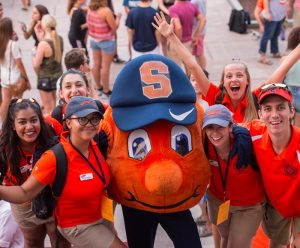 Falk College is thrilled to welcome back returning Syracuse students and to extend a special welcome to the Class of 2022, new transfer and graduate students! We are so happy to have you in the Orange family, as well as our family here at Falk College. As you meet your professors, classmates, and roommates, you’ll soon be feeling right at home. We are here to help you along the way. If you have any questions or concerns, please connect with Falk College’s Office of Student Services at (315) 443-3144 or falkss@syr.edu or visit 330 Barclay Hall in the Falk Complex.
Falk College is thrilled to welcome back returning Syracuse students and to extend a special welcome to the Class of 2022, new transfer and graduate students! We are so happy to have you in the Orange family, as well as our family here at Falk College. As you meet your professors, classmates, and roommates, you’ll soon be feeling right at home. We are here to help you along the way. If you have any questions or concerns, please connect with Falk College’s Office of Student Services at (315) 443-3144 or falkss@syr.edu or visit 330 Barclay Hall in the Falk Complex.
Here are a few tips to help you get settled during these first few weeks:
Download the Syracuse Welcome Guide. Available through the Office of First-Year and Transfer Programs, the 2018 Syracuse Welcome Guide contains the complete schedule for Syracuse Welcome 2018 and other important information about your arrival at Syracuse University.
In addition, new graduate students should visit the graduate school website and check out the calendar of events specifically for graduate students. Similarly, new international students can find helpful information by visiting the Slutzker Center for International Services.
Attend New Student Convocation for new students and families on Thursday, August 23 at 5:30 p.m. in the Carrier Dome.
Attend Falk College welcome events. Please join us for the Dean’s Reception for new students and families on Friday, August 24 from 10 to 11 a.m. in Grant Auditorium in the Falk Complex, followed by light refreshments served outside in the Falk Courtyard. Afterwards, the Dean’s Welcome Meeting for new students will take place at 1:30 p.m. in Grant Auditorium immediately followed by Department Meetings from 1:45 to 3 p.m.
Explore the Student Involvement Fair Wednesday, September 5 on the Quad from 11:30 a.m. to 3:00 p.m. In the case of rain, it will be held in Goldstein Auditorium in the Schine Student Center. With more than 300 student organizations on campus, we are confident you’ll find something that fits your interests.
Check your SU email account. As a Syracuse University student, you now have a SU email account. The University’s primary method of communication is email sent to your SU account (not your personal email account). It is very important that you check your SU email account on a regular basis so you do not miss important communications from the University. If you have any questions, please contact Information Technology Services (ITS).
Connect with Falk College on social media. You can follow us @SUFalkCollege. Many other Syracuse University offices, schools, colleges, academic programs, clubs and more are also on social media. Visit the Social Media Directory. It’s a great way to discover all that’s happening on campus.
Finally, remember the Falk College Office of Student Services is here to help you with any questions or concerns. Once again, welcome and best of luck! Let’s make this semester a great one!
Welsh’s expertise in agriculture’s technological change shared with U.S. EPA scientific panel
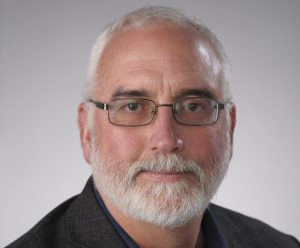 A critical issue facing U.S. and global agriculture, specifically corn and cotton crops, is widespread resistance to crops genetically engineered to manifest the soil bacteria bacillus thuriengensis or Bt. The U.S. Environmental Protection Agency (U.S. EPA) has convened a Scientific Advisory Panel (SAP) to consider a set of eight Charge Questions related to the issue titled: “Resistance of Lepidopteran Pests to Bacillus thuringiensis (Bt) Plant Incorporated Protectants in the United States.” Rick Welsh, the Falk Family Endowed Professor of Food Studies, served as an ad hoc panel member during a workshop held in Rosslyn, VA from July 17-20.
A critical issue facing U.S. and global agriculture, specifically corn and cotton crops, is widespread resistance to crops genetically engineered to manifest the soil bacteria bacillus thuriengensis or Bt. The U.S. Environmental Protection Agency (U.S. EPA) has convened a Scientific Advisory Panel (SAP) to consider a set of eight Charge Questions related to the issue titled: “Resistance of Lepidopteran Pests to Bacillus thuringiensis (Bt) Plant Incorporated Protectants in the United States.” Rick Welsh, the Falk Family Endowed Professor of Food Studies, served as an ad hoc panel member during a workshop held in Rosslyn, VA from July 17-20.
Syracuse University’s food studies program is often sought after for expertise on U.S. and global agriculture issues. Welsh, who chairs Falk College’s Department of Public Health, Food Studies and Nutrition, has a long record of surveying and interviewing farmers about technological change in agriculture and related environmental management strategies. The author of numerous publications on environmental regulation of Genetically Engineered Crops, he brought expertise to the SAP primarily regarding farmer non-compliance with refuge requirements for Bt crops.
The commercialization of Bt crops in the early 1990s led to rapid adoption rates among U.S. farmers. Because of the widespread use of Bt crops, the U.S. EPA was concerned that pest populations in these crops would develop Bt resistance. Therefore, it required farmers to plant non-Bt crops on a small percentage of their land to create refuges for susceptible pest populations. According to Welsh, “this theoretically would delay or forestall resistance development since a population of susceptible insects would be maintained. However, it appears that at least in the southern states, farmers have not complied with the requirements, and widespread resistance for major pests of corn and cotton has emerged.”
Page 13 of 21

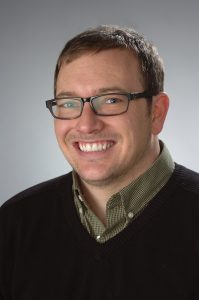 Lorem ipsum dolor sit amet, consectetur adipiscing elit. Morbi ac sem eleifend, fringilla nulla suscipit, pretium elit. Vestibulum sed velit purus. Nunc accumsan condimentum sagittis. Nulla vel lorem ac ipsum convallis aliquam vel accumsan justo. Mauris venenatis odio rhoncus egestas pharetra. Suspendisse imperdiet ullamcorper mauris, quis molestie lacus ullamcorper non. Vestibulum diam sapien, condimentum quis mattis in, condimentum eget leo.
Lorem ipsum dolor sit amet, consectetur adipiscing elit. Morbi ac sem eleifend, fringilla nulla suscipit, pretium elit. Vestibulum sed velit purus. Nunc accumsan condimentum sagittis. Nulla vel lorem ac ipsum convallis aliquam vel accumsan justo. Mauris venenatis odio rhoncus egestas pharetra. Suspendisse imperdiet ullamcorper mauris, quis molestie lacus ullamcorper non. Vestibulum diam sapien, condimentum quis mattis in, condimentum eget leo.